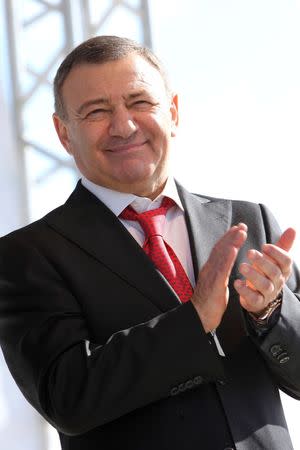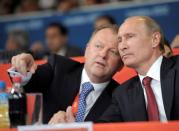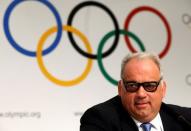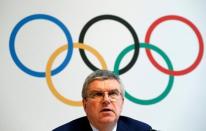Exclusive - Scrutiny on global sport bodies as they decide Russians' Olympic fates
By Christian Lowe and Aleksandar Vasovic MOSCOW/BELGRADE (Reuters) - The International Olympic Committee's decision to let individual sport federations decide whether to ban Russians from the Rio games over doping has put Moscow's links to the governing bodies under scrutiny. In the latest announcement by a sport governing body, the head of the International Judo Federation told Reuters on Tuesday it would allow the Russian squad to compete. The federation lists Russian President Vladimir Putin, a judo blackbelt, as its honorary president. One of Putin's closest personal friends, his judo sparring partner Arkady Rotenberg, sits on the federation's executive board and is head of a charity that has helped fund it. The federation's president, Romanian-born former competitor and coach Marius Vizer, denied there was a conflict of interest and said neither Putin's nor Rotenberg's roles played any part in its decision to allow Russians to compete. The 11 Russian competitors who had qualified for the Olympics had been tested regularly outside Russia since September last year and those tests had not revealed any evidence of doping, Vizer said. "The main characteristic, and the main value of judo is honour. Honour, dignity and respect. And we don't only say that, we mean that as well." But critics say governing bodies will have to do more to demonstrate that they can make their decisions independent of influence of Russian officials and businessmen who frequently hold leadership positions across international sport. "I think that each of them should be asked: 'How do you deal with conflicts, how to assure the rest of the world and especially athletes from non-Russian countries that you will make, and are making, decisions in an impartial way?'" said Joseph de Pencier, chief executive of the 59-member Institute of National Anti-Doping Organizations. NO BAN The IOC was widely expected to ban Russian competitors from Rio last week after the World Anti-doping Agency concluded that Moscow had run a state-sponsored campaign of doping. But instead of a blanket ban, it put the decision in the hands of the governing bodies of individual sports, saying each had its own rules and mechanisms for determining whether cheating took place. In several of those federations, Russian officials and businessmen play important roles. So far, in addition to judo, tennis and shooting sport have announced that Russian competitors will not be blocked from the Olympics. At least three sports -- track and field, swimming and canoeing -- have banned Russians. In the case of the International Shooting Sport Federation, one of the governing body's vice-presidents is Vladimir Lisin, who also serves as president of the Russian Shooting Union. Lisin is the majority owner of Russia’s No.1 steelmaker NLMK and, according to Forbes magazine, the 8th richest person in Russia with a net worth of $11.8 billion. He is also vice president of the Russian Olympic Committee. The shooting federation said in a statement Lisin's role did not influence the decision on Russian competitors in Rio, and he was asked not to vote to avoid the appearance of a conflict. Other sports governing bodies with high-profile Russian links include the International Fencing Federation, whose president is Russian billionaire Alisher Usmanov, and United World Wrestling, whose leader has family ties to a construction firm that has won state contracts in Russia. The wrestling and fencing bodies have yet to announce their positions on Russian participation in the Olympics. HIGHEST VALUES No sport is more closely associated with Putin than judo, which he has practiced since his youth. The 63-year-old president has frequently been shown on television in judo gyms throwing opponents to the mat throughout his 16 years in power. The governing body's president, Vizer, said there could be no suggestion of a conflict of interest in his decision to allow the seven male and four female Russian competitors to take part in the Olympics. "I never did any business in Russia, I don't depend on Russia. In this world I only depend on myself and my highest values in this life are honor and dignity," he said. "Be sure that my decision is based only on my principles and the principles of our sport: honesty, fairness and integrity." Vizer said that, as far as he could remember, the International Judo Fund, of which Putin's friend Rotenberg is president, had not given the federation financial support since 2009 and that the money was ring-fenced for a specific project to develop judo. Representatives for Rotenberg, a billionaire industrialist who has been placed on a U.S. sanctions blacklist because of his close ties to Putin, did not respond to a request for comment. MAJOR POWER Russian officials say the country's representation in international sporting bodies reflects its role as a major global sporting power and the private philanthropy of some of its businessmen. In the case of fencing, not only is Usmanov the president of the governing body, he is also the founder of the International Charity Fund for the Future of Fencing, which the fencing federation identifies as one of its three sponsors. The second sponsor is Megafon, a Russian telecoms company majority-owned by Usmanov. A spokesman for the International Fencing Federation said in response to questions from Reuters that a statement was being prepared. Usmanov's representatives did not respond to a request for comment. United World Wrestling, which governs the two Olympic disciplines of Greco-Roman and freestyle wrestling, is led by Nenad Lalovic, a Serbian businessman whose biography on the federation's website describes him as a "current partner" in a "construction company that operated in Russia". Although the biography does not name his firm, a company filing lodged with the Nevada state authorities in the United States named Nenad Lalovic as president of a firm called PSP-Farman Corp. The U.S. firm was dissolved in 2002, according to the Nevada filing. But PSP-Farman is also the name of a Serbian-Russian construction group which still operates and which says on its website it has won contracts from, among other clients, Russia's central bank, Russian state-owned gas exporter Gazprom, and state broadcaster Russia Today. Reuters was not able to establish what role if any Lalovic now holds with the company, but his son and daughter have both worked there. Company records for Jugodrvo Holding, a part of the PSP-Farman group based in Belgrade, list Milos Lalovic as a shareholder in Jugodrvo. A woman who answered the phone in the Belgrade offices of the group identified Milos Lalovic as the son of Nenad Lalovic and said the younger man worked there, although she did not say what his role was. The wrestling federation boss's daughter Nina Lalovic says on her LinkedIn profile that she worked in sales and marketing for PSP-Farman from May 2011 to September 2012, and later worked for three years in the Belgrade offices of NIS Gazpromneft, a Serbian unit of Gazpromneft, a Russian state oil producer. United World Wrestling did not respond to questions from Reuters. Lalovic did not reply to messages sent to his federation email address. Branislav Grujic, a joint president of PSP-Farman, did not respond to email messages or calls to his mobile telephone. Nenad Lalovic issued a statement on Tuesday via United World Wrestling saying that the body was starting a process to "validate" each Russian wrestler qualified for Rio to ensure they were not implicated in doping. "United World Wrestling is committed to work jointly with the World Anti-Doping Agency and the IOC to preserve the integrity of sport and ensure wrestlers are clean," Lalovic's statement said. (Additional reporting by Jack Stubbs; Anastasia Teterevleva and Gleb Stolyarov; Editing by Peter Graff)

 Yahoo Sport
Yahoo Sport 















































